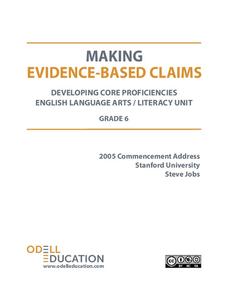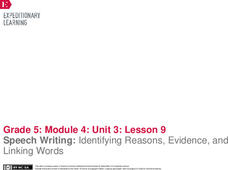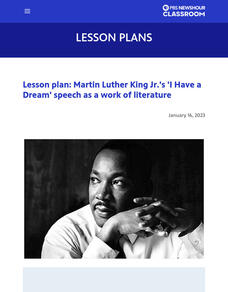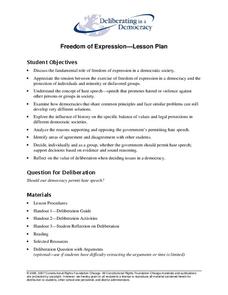Odell Education
Making Evidence-Based Claims: Grade 6
In order to make evidence-based claims, one must be able to draw explicit information from text. From here, learners take that information, analyze the text to develop a deeper understanding, and connect with the information in order to...
K12 Reader
MLK: Complete the Speech
Take a close look at a few paragraphs of Martin Luther King, Jr.s' famous speech, "I Have a Dream." Class members fill in the missing words using the bank of words provided and then respond to a question about the speech and modern day...
University of California
The Civil War: Lincoln’s Speeches
Abraham Lincoln is responsible for uniting the states during the most tumultuous periods in American history, and for his elegant oratory that kept the Union believing in its cause. Young histoians analyze various speeches by America's...
Curated OER
Persuasive Speech Assignment
Practice using concrete evidence from various sources to back up an argument. The lesson emphasizes the use of support in a persuasive speech, as well as the importance of appealing to an audience's logic and emotions. You could modify...
University of North Carolina
Speeches
A handout on speeches, part of a series on specific writing assignments, helps individuals develop their speech-writing skills. The resource starts with a discussion on audience and purpose and ends with tips to engage the audience.
Building Evidence-Based Arguments: Grade 9
High schoolers investigate the dilemma of a proportional response with a lesson about the history of terrorism and militant extremists in the United States. As they examine memos from the FBI and speeches from President Bush and Obama,...
EngageNY
Speech Writing: Identifying Reasons, Evidence, and Linking Words
Enjoy the view. Scholars continue viewing a video of an opinion speech, this time identifying the supporting evidence the speaker employs. After watching, they work in small groups on their shared writing projects, crafting a body...
EngageNY
Mid-Unit 3 Assessment, Part II: Organizing Notes for a Public Speech
It's all a matter of opinion! Pupils take Part II of the mid-unit assessment, in which they continue organizing their notes in preparation for writing an opinion speech. Using the resource, they add reasons, evidence, and a concluding...
Cloud Front
Persuasive Speech Graphic Organizer
Support your learners during the speech-writing process with a five-page graphic organizer. Pupils have plenty of space to write in their evidence and arguments on this resource. The organizer provides some prompts for each section to...
EngageNY
Analyzing Language in a Speech: The Montgomery Bus Boycott Speech
Scholars analyze the use of active and passive voice in The Montgomery Bus Boycott speech and refer to an Active and Passive Sentences handout while viewing the text. Pairs of learners then work together to identify passive and active...
Fluence Learning
Writing an Argument: Free Speech
How do you assess whether pupils have mastered certain concepts and skills? Designing a performance task that asks learners to demonstrate their skills and providing writers with a rubric that identifies these skills and provides...
EngageNY
Close Reading: The Montgomery Bus Boycott Speech
How did Martin Luther King, Jr. sway people with his speeches? Scholars carry out a close reading of the Montgomery Bus Boycott speech and use the Close Reading Guide to help them work through the powerful text. While reading, they...
Curated OER
Ethos, Logos, and Pathos in Civil Rights Movement Speeches
Examine three speeches while teaching Aristotle's appeals. Over the course of three days, class members fill out a graphic organizer about ethos, pathos, and logos, complete an anticipatory guide, read speeches by Martin Luther King Jr.,...
EngageNY
Advantages and Disadvantages of Various Mediums: The Montgomery Bus Boycott Speech
Text, speech, phone call. Scholars discuss the advantages and disadvantages of using speech and written text to express ideas. They use an Analyzing Mediums graphic organizer to analyze speeches by Martin Luther King Jr. They then...
PBS
Dr. Martin Luther King Jr.’s ‘I Have a Dream’ Speech as a Work of Literature
To appreciate the oratory of Dr. Martin Luther King Jr.'s "I Have a Dream" speech, scholars examine the rhetorical devices and influences that make the speech so famous. They examine background information, conduct a close reading of the...
Curated OER
Persuasion as Text: Organizational, Grammatical, and Lexical Moves in Barbara Jordan’s "All Together Now"
A thorough lesson on persuasive writing takes middle schoolers through several activities, including group discussion, collaborative posters, and independent writing. They compare historical speeches and analyze the persuasive techniques...
Literacy Design Collaborative
Elie Wiesel's Acceptance Speech Analysis
Elie Wiesel's Nobel Prize Acceptance speech provides young historians with an opportunity to demonstrate their ability to use evidence from the speech. They work together to analyze how Wiesel uses rhetorical devices and syntax to...
Franklin D. Roosevelt Presidential Library & Museum
Pearl Harbor Activity #4: Who is the Audience?
Young historians use the prompts on a worksheet to analyze President Roosevelt's "Day of Infamy" speech. They identify the intended audience for the speech, the devices FDR used to persuade his audience, the responses promoted, and the...
Curated OER
Norman Rockwell, Freedom of Speech: Know It When You See It
Students explore the U.S. Constitution. In this First Amendment lesson, students examine Norman Rockwell's "Freedom of Speech" and analyze the five freedoms listed in the amendment.
Curated OER
Fredrick Douglass' Speech on Women's Suffrage
“When a great truth once gets abroad in the world, no power on earth can imprison it, or prescribe its limits, or suppress it.” These words come from Frederick Douglass’ April, 1888 speech to the International Council of Women. One of...
Curated OER
The Power of Speech
Learners prepare and deliver a speech on equal rights. They explore equal rights issues as they practice the skills necessary for public speaking.
Deliberating in a Democracy
Freedom of Expression
Should democracies include hate speech as a protected right? Scholars analyze the rights found under the First Amendment to the Constitution through researching evidence. Freedom of expression becomes the focal point of the...
Curated OER
Express Yourself Lesson Seed 14: Dedication
Connect Martin Luther King Jr's famous speech, "I Have a Dream," to The Cay by Theodore Taylor. Taylor refers to the speech in his dedication, which creates a natural segue into talking about the speech and how it relates to the novel....
State Bar of Texas
Tinker v. Des Moines
Freedom of speech allows anyone, even those in school, to say and do what they feel—right? The 1969 Supreme Court case Tinker v. Des Moines serves as the backdrop for a study on First Amendment rights. Scholars use a short video along...

























